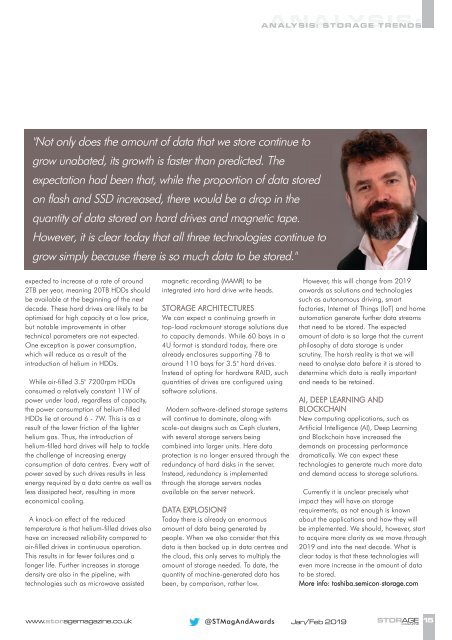ST1901
You also want an ePaper? Increase the reach of your titles
YUMPU automatically turns print PDFs into web optimized ePapers that Google loves.
ANALYSIS:<br />
ANALYSIS: STORAGE TRENDS<br />
"Not only does the amount of data that we store continue to<br />
grow unabated, its growth is faster than predicted. The<br />
expectation had been that, while the proportion of data stored<br />
on flash and SSD increased, there would be a drop in the<br />
quantity of data stored on hard drives and magnetic tape.<br />
However, it is clear today that all three technologies continue to<br />
grow simply because there is so much data to be stored."<br />
expected to increase at a rate of around<br />
2TB per year, meaning 20TB HDDs should<br />
be available at the beginning of the next<br />
decade. These hard drives are likely to be<br />
optimised for high capacity at a low price,<br />
but notable improvements in other<br />
technical parameters are not expected.<br />
One exception is power consumption,<br />
which will reduce as a result of the<br />
introduction of helium in HDDs.<br />
While air-filled 3.5" 7200rpm HDDs<br />
consumed a relatively constant 11W of<br />
power under load, regardless of capacity,<br />
the power consumption of helium-filled<br />
HDDs lie at around 6 - 7W. This is as a<br />
result of the lower friction of the lighter<br />
helium gas. Thus, the introduction of<br />
helium-filled hard drives will help to tackle<br />
the challenge of increasing energy<br />
consumption of data centres. Every watt of<br />
power saved by such drives results in less<br />
energy required by a data centre as well as<br />
less dissipated heat, resulting in more<br />
economical cooling.<br />
A knock-on effect of the reduced<br />
temperature is that helium-filled drives also<br />
have an increased reliability compared to<br />
air-filled drives in continuous operation.<br />
This results in far fewer failures and a<br />
longer life. Further increases in storage<br />
density are also in the pipeline, with<br />
technologies such as microwave assisted<br />
magnetic recording (MAMR) to be<br />
integrated into hard drive write heads.<br />
STORAGE ARCHITECTURES<br />
We can expect a continuing growth in<br />
top-load rackmount storage solutions due<br />
to capacity demands. While 60 bays in a<br />
4U format is standard today, there are<br />
already enclosures supporting 78 to<br />
around 110 bays for 3.5" hard drives.<br />
Instead of opting for hardware RAID, such<br />
quantities of drives are configured using<br />
software solutions.<br />
Modern software-defined storage systems<br />
will continue to dominate, along with<br />
scale-out designs such as Ceph clusters,<br />
with several storage servers being<br />
combined into larger units. Here data<br />
protection is no longer ensured through the<br />
redundancy of hard disks in the server.<br />
Instead, redundancy is implemented<br />
through the storage servers nodes<br />
available on the server network.<br />
DATA EXPLOSION?<br />
Today there is already an enormous<br />
amount of data being generated by<br />
people. When we also consider that this<br />
data is then backed up in data centres and<br />
the cloud, this only serves to multiply the<br />
amount of storage needed. To date, the<br />
quantity of machine-generated data has<br />
been, by comparison, rather low.<br />
However, this will change from 2019<br />
onwards as solutions and technologies<br />
such as autonomous driving, smart<br />
factories, Internet of Things (IoT) and home<br />
automation generate further data streams<br />
that need to be stored. The expected<br />
amount of data is so large that the current<br />
philosophy of data storage is under<br />
scrutiny. The harsh reality is that we will<br />
need to analyse data before it is stored to<br />
determine which data is really important<br />
and needs to be retained.<br />
AI, DEEP LEARNING AND<br />
BLOCKCHAIN<br />
New computing applications, such as<br />
Artificial Intelligence (AI), Deep Learning<br />
and Blockchain have increased the<br />
demands on processing performance<br />
dramatically. We can expect these<br />
technologies to generate much more data<br />
and demand access to storage solutions.<br />
Currently it is unclear precisely what<br />
impact they will have on storage<br />
requirements, as not enough is known<br />
about the applications and how they will<br />
be implemented. We should, however, start<br />
to acquire more clarity as we move through<br />
2019 and into the next decade. What is<br />
clear today is that these technologies will<br />
even more increase in the amount of data<br />
to be stored.<br />
More info: toshiba.semicon-storage.com<br />
www.storagemagazine.co.uk<br />
@STMagAndAwards<br />
Jan/Feb 2019<br />
STORAGE<br />
MAGAZINE<br />
15

















